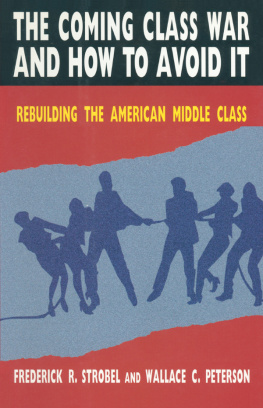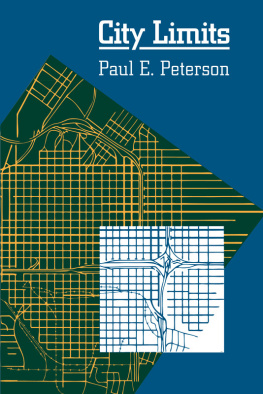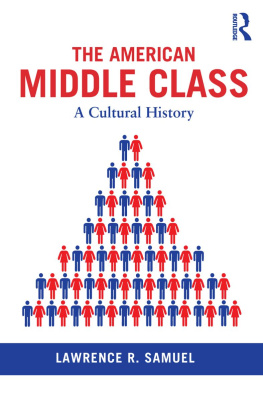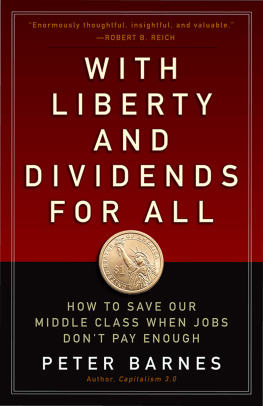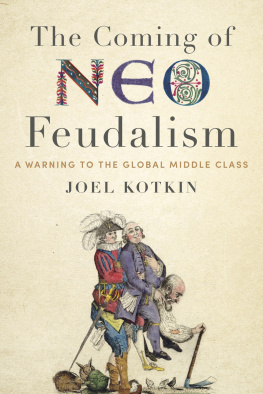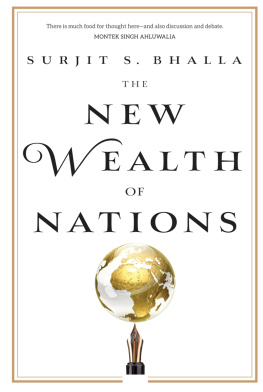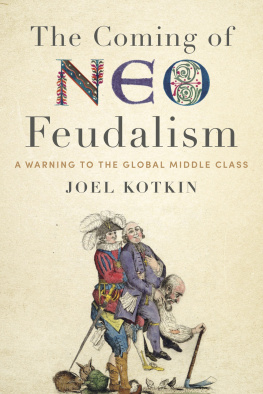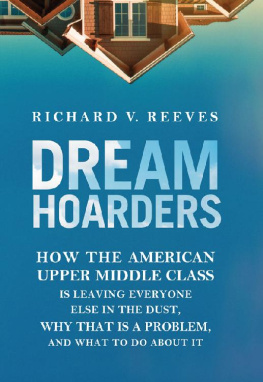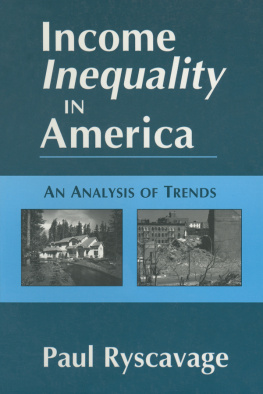THE COMING CLASS WAR
AND HOW TO AVOID IT
THE COMING CLASS WAR
AND HOW TO AVOID IT
REBUILDING THE AMERICAN MIDDLE CLASS
FREDERICK R. STROBEL
AND
WALLACE C. PETERSON
First published 1999 by M.E. Sharpe
Published 2015 by Routledge
2 Park Square, Milton Park, Abingdon, Oxon OX14 4RN
711 Third Avenue, New York, NY 10017, USA
Routledge is an imprint of the Taylor & Francis Group, an informa business
Copyright 1999 Taylor & Francis. All rights reserved.
No part of this book may be reprinted or reproduced or utilised in any form or by any electronic, mechanical, or other means, now known or hereafter invented, including photocopying and recording, or in any information storage or retrieval system, without permission in writing from the publishers.
Notices
No responsibility is assumed by the publisher for any injury and/or damage to persons or property as a matter of products liability, negligence or otherwise, or from any use of operation of any methods, products, instructions or ideas contained in the material herein.
Practitioners and researchers must always rely on their own experience and knowledge in evaluating and using any information, methods, compounds, or experiments described herein. In using such information or methods they should be mindful of their own safety and the safety of others, including parties for whom they have a professional responsibility.
Product or corporate names may be trademarks or registered trademarks, and are used only for identification and explanation without intent to infringe.
Library of Congress Cataloging-in-Publication Data
Strobel, Frederick R.
The coming class war and how to avoid it: rebuilding the American middle class/Frederick R. Strobel and Wallace C. Peterson.
p. cm.
Includes bibliographical references and index.
ISBN 0-7656-0197-4 (alk. paper)
1. Middle classUnited States. 2. Social classesUnited States.
3. Social conflictUnited States. I. Peterson, Wallace C.
HT690.U6S766 1999
305.5dc21
9824522
CIP
ISBN 13: 9780765601971 (hbk)
For Kathy
In Memory of Bonnie
Contents
This book had its roots in the congressional election results of 1994. Within the past two years we had both written books on the economic decline of the American middle class. To our astonishmentto use a euphemisma Republican Congress was elected with the substantial help of this declining middle class.
The American middle class has seen a steady economic decline since the early 1970s. Moreover, the long-range prospects for a reversal in these trends, in our opinion, is rather dim. While the United States has seen a sustained economic recovery since 1992 as reflected in growing real GDP and falling unemployment rates, real earnings growth only meaningfully began in 1997. However, the growth in the rewards to capital as measured by a booming stock market have been no less than spectacular and have outpaced the growth in labor earnings by a wide margin. In sum, the 1973 to 1996 economic era has been far different than most periods of the twentieth century. In the Great Depression everyone became poorer, including the rich. In the postwar recovery, from 1946 to the early 1970s, everyone prospered, and the middle class gained along with the rich. But then something new began to happen. In the sluggish growth years that followed, the middle class shrank from over 70 percent of the population to around 60 percent. The upper class grew rich at the expense of the middle and lower classes. This was indeed a new experience for late twentieth-century American capitalism.
Finally in 1997, American labor recorded an acceptable growth in real earnings of 2.1 percent, after nine years of negative or less than 1 percent growth. Yet, throughout most of this economic recovery, gains have been lopsided and accruing to the upper 1 percent of the population. Merger and acquisition activity continues to reach record levels year after year, and the process of a more skewed distribution of income proceeds unabated. While the country is lost in the euphoria of a strong economic recovery, it refuses to recognize the continued trends in capital accumulation by a very small portion of the society. We believe that this newly capital-enhanced group in the society will not be content with the enormous gains it has made since the mid-1970s. Rather, it will continue to press for more redistribution to itself at the expense of middle and lower classes. Such efforts will manifest themselves in continued consolidation of business and industry and pressures for tax changes such as a flat tax to eliminate the deductions for mortgage interest and property taxesone of the few remaining tax benefits to the middle and lower classesand the Substitution of a consumption tax, otherwise called a national sales tax or a value-added tax, for the corporate income tax. Repeated attempts will also be made to shift the control of the enormous accumulated surplus in the Social Security fund to management by private financial interests, not only weakening this vital American program for the elderly but also greatly enhancing the potential for financial theft and scandal.
Throughout the coming years, if the current trends continue, further accumulation by the very rich will promote hardship, resentment, and unhappiness among the losers. Class conflict may well be the order of the day. As in the 19701980 period, this class conflict will find itself being redirected to conflicts within the middle and lower classes, as a distraction from the continued wealth accumulation at the top. Should this happen, America will be a decidedly less pleasant place to live, and concepts such as democratic capitalism will be greatly weakened, leaving us open to a much more oppressive and more authoritarian government. We firmly hope that this will not happen. Hopefully this book will help to serve, along with several other voices, as a wake-up call for American business and industry leaders to help save competitive capitalism (and themselves).
We would like to thank the office staffs at the University of Nebraska at Lincoln and at New College at Sarasota, Florida, for their able assistance. At New College, particular praise is due to Jenny Smitha for her excellent word processing skills and the genial way in which she performed these tasks. Special thanks also to Dr. David Barclay, Professor of History at Kalamazoo College, for reading an early draft of the manuscript and making numerous valuable comments and suggestions. In an endeavor of this sort supporters should also be thanked, such as economist colleagues Richard Coe, Catherine Elliott, and family members Heidi and and Gretchen Strobel, Christina Cashen, Cary Peterson, and Shelley Davis. History Professor Justus Doenecke of New College should be thanked for serving as a gold mine of information of twentieth-century people and economic and political events. Kavi Sadhwani, New College Class of 1997, made numerous valuable suggestions, reading the book in manuscript form.
In some ways we find it hard to criticize a country and a system that has been so good to each of us. However, what we are criticizing is not the system in which we made our careers, a system largely protected by the humane measures engendered by the enlightened reforms of the New Deal. Rather we are criticizing an evolving system of personal greed and a disregard for the equitable distribution of productivity gains, which will greatly restrict the economic prospects for our children and grandchildren.


